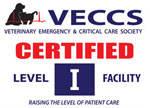Date:
By Alan Green and Lisa Olsen
We have often described the trouble our pets get in when consuming food or things that they shouldn't be eating. Just when we think we’ve seen it all, our wonderful critical care specialist and newest member of our team, Dr. Lisa Olsen, presents a truly remarkable case. Hint: Be careful what you bring back from vacations!
Pets will eat anything and some toxicities are more common than others. Here at Charleston Veterinary Referral Center we frequently encounter dogs that eat chocolate, ibuprofen, grapes/raisins or human medications. However, earlier this year the doctors and staff at CVRC encountered a toxin they’d never had experience with before!
On January 20, Tempeh, an eight-year-old, spayed, female Schipperke, was brought in by her owners after ingesting a bracelet that they had received as a gift during one of their mission trips to Peru. The bracelet consisted of porcupine quills and beans from the Abreus precatoriusplant, which are frequently used as prayer beads by local tribes. Unbeknownst to Tempeh’s owners, this particular bracelet is illegal to own in the United States due to its highly toxic potential.
While whole beans have the potential to pass through the intestinal tract whole, if the beans are chewed or cracked the toxin can cause severe organ failure. While her owners were out of the house, Tempeh found the bracelet on the coffee table, chewed it into multiple small pieces and ingested several whole and cracked beans. The beans contain a compound called abrin, a toxin whose symptoms are similar to ricin, a biologic warfare agent used during World War One. Unfortunately, abrin is so potent that the fatal dose is only 1/75th that of the fatal dose of ricin itself. This toxin inactivates the ribosome, a microscopic organ within each of our cells that is responsible for producing proteins, which are essential to every function within our body. A single molecule of this toxin can inactivate 1,500 ribosomes every second and a dose of .00015 percent body weight (the equivalent of 1/10th of a milligram for a 150 pound human) can cause significant toxicity.
Tempeh’s owners contacted the ASPCA pet poison control hotline, who recommended feeding her bread, followed by inducing vomiting at home. While Tempeh successfully vomited, none of the bracelet was recovered. Symptoms of poisoning can include vomiting, severe stomach and intestinal ulcers, kidney failure, liver failure and seizures. Given Tempeh’s size, unknown time since ingestion and significant quantity ingested, Tempeh was immediately brought to CVRC for further care. With a very grave prognosis, Tempeh’s owners opted for aggressive inpatient care and monitoring in the hope of minimizing the effects of this rare toxin.
Tempeh was bright, alert and apparently healthy at the time of presentation and her baseline bloodwork (notably markers of liver and kidney function) was normal. Abdominal radiographs revealed evidence of beans within her intestinal tract, too far beyond the stomach to be effectively recovered with gastric lavage. Additionally, we noted evidence of pre-existing kidney changes, making aggressive inpatient care that much more important to protect organ function and avoid failure.
Tempeh was treated supportively with IV fluids, GI protectants, a liver protectant, administration of activated charcoal to bind the toxin and a high-fiber diet to promote passage of whole or partial beans through the intestinal tract quickly. To minimize any accidental toxicity to other scavenging wildlife, her stools were all collected, though no evidence of the beans was noted on the second day. Tempeh remained bright, alert and responsive while blood work remained normal throughout and following three-day hospitalization.
Tempeh was very lucky that this toxicity was recognized early so that preventative measures could be taken. Due to her family’s quick action and the 24-hour supportive care she received, Tempeh beat the odds. We are so very happy to see her still doing so well at home!
If you ever have questions regarding whether something your pet ate could be toxin, please don’t hesitate to contact the doctors and staff at Charleston Veterinary Referral Center at (843) 614-8387 or the ASPCA pet poison control at (888) 426-4435.







